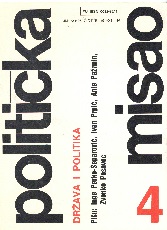Običajnost države kod Hegela
Hegel's Concept of the Mores of Ethical Life in the State
Author(s): Ante PažaninSubject(s): Politics, Ethics / Practical Philosophy, Political Philosophy, Political Theory
Published by: Fakultet političkih znanosti u Zagrebu
Keywords: Hegel; Concept of the Mores of Ethical Life in the State;
Summary/Abstract: The author's aim is to rescue Hegel’s concept of the mores of ethical life (die Sittlichkeit) in general, and with regard to the state in particular, from erroneous interpretations which even today associate this concept with totalitarianism. Hegel transcended Kant’s understanding of die Sittlichkeit as morality. This paper tries to demonstrate and to indicate the present-day relevance of Aristotle’s and Hegel’s understanding of die Sittlichkeit as the mores of ethical life. The author denotes the difference between Kant's morality and Hegel’s die Sittlichkeit by using two Croatian words, 'ćudorednost' and ’običajnost’. The mores of ethical life also involve subjective knowledge and individual conviction. They do not signify getting mechanically accustomed to existing manners and laws, but are based on the conviction and self¬ -awareness of the individual who by acting within the historical world of living assumes and carries the responsibility for his own existence and historical continuity. The concept of the mores of ethical life understood in this way differs not only from the so¬ -called substantial ethical mores of the family and the state of Antiquity, but also from the modern-age morality and the privatized mores of the emancipated subjectivity’s and Individuality’s ethical life. It is known that Hegel effects a mediation between modern-age morality and the substantiality of Antiquity through the mores of the ethical life of the family, the bourgeois society', and the state, as it is contained in the Grundlinien der Philosophic des Redits. loss well known is the fact that the late Hegel, and in particular in his Vorlesunpen tiber die Philosophie der Weltgeschichte, expands the concept of the mores of ethical life so as to include in it not only the state as "Machtstaat" but also as "Kulturstaat"; indeed, as “sittliche Lebendigkeit" it covers all "ideational manners in which the spirit o f a people becomes aware of itself". The author stresses this “Vitality of the mores of ethical life- of the historical world and the state as a unity of these mores and a community of a culture of the spirit and the free activity of the citizens, who through their knowledge and their will for generality realize freedom as their own substantial purposes of living.
Journal: Politička Misao
- Issue Year: XXIV/1987
- Issue No: 04
- Page Range: 24-37
- Page Count: 14
- Language: Croatian

